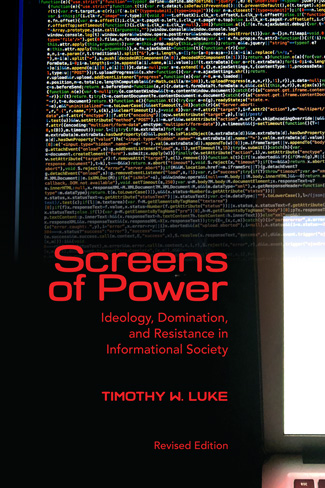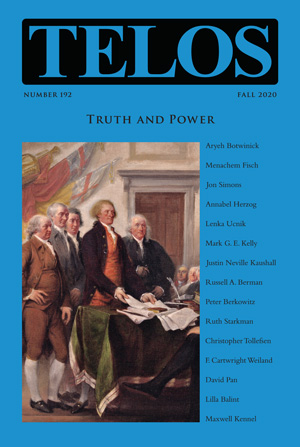In today’s episode of the Telos Press Podcast, Camelia Raghinaru talks with John Milbank about his article “In Triplicate: Britain after Brexit; the World after Coronavirus; Retrospect and Prospect,” from Telos 191 (Summer 2020). An excerpt of the article appears here. If your university has an online subscription to Telos, you can read the full article at the Telos Online website. For non-subscribers, learn how your university can begin a subscription to Telos at our library recommendation page. Purchase a print copy of Telos 191 in our online store.
|
Aryeh Botwinick’s “Negative Theology, Power, and the Israeli–Palestinian Conflict” appears in Telos 192 (Fall 2020): Truth and Power. Read the full article at the Telos Online website, or purchase a print copy of the issue in our online store. Individual subscriptions to Telos are available in both print and online formats. The President of France, Emmanuel Macron, delivered this speech on September 4, 2020. I discussed it in a TelosScope post here, putting it in dialogue with President Trump’s Mount Rushmore speech of July 4. There has been interest on the part of some readers in a full translation of Macron’s text, so it is offered below. The context: Macron is welcoming a group of newly naturalized citizens into the national community. Hence his double agenda: on the one hand, highlighting the diversity of France as an immigrant nation, while on the other insisting on the unity of French history, culture, language, and above all the Republic. This is a speech about the Republican values that Macron expects all French citizens to share and, what’s more, to uphold actively and vigorously. “Liberty, Equality, Fraternity” have a standing in French political culture similar to “life, liberty, and the pursuit of happiness” from the American Declaration of Independence. In the wake of recent killings in Paris and Nice, as well as in Vienna, the debate over “Islamism” has regained prominence in Europe, especially in France. Islamism as a political ideology must of course be rigorously distinguished from Islam, the religion. That conceptual distinction ought to be readily understandable and familiar from previous iterations of responses to terrorism. What however appears to be new in the current French discussion is the perceived linkage between Islamism, terrorist violence, and academic post-colonialism, regarded as providing a justification for the violence. That association is being made at high levels in the Macron government, generating considerable controversy. That is the context for the open letter published in Le Monde, translated below. Do academic ideas have consequences in the world? Elham Manea teaches Political Science at the University of Zurich. Her forthcoming book The Perils of Nonviolent Islamism will be published by Telos Press in the spring and can be pre-ordered today in our store. The following talk was delivered as a keynote speech in German at the Convention of the Schader Foundation in Darmstadt (online) on November 6, 2020. It is becoming difficult lately to turn on the news. And I do not just mean the American presidential elections. The year 2020 was and still is a hard one. COVID-19 has dominated our lives with its limitations. But it has also welded people together in every corner of the world in the fight against a persistent and ultimately deadly virus. This struggle, this common challenge, has united us and yet divided us. We are still irritated by the lockdowns, afraid of their economic repercussions, and divided in our ideological fronts. Times like these are worrying and provide fertile ground for conspiracy theorists and right-wing and left-wing extremist groups. In times like these, our societies can all too easily become polarized, and we run the risk of being trapped in a discourse of division, trapped in identity boxes. “Us” versus “Them.” |
||||
|
Privacy Policy · Data Protection Copyright © 2026 Telos Press Publishing · All Rights Reserved |
||||




